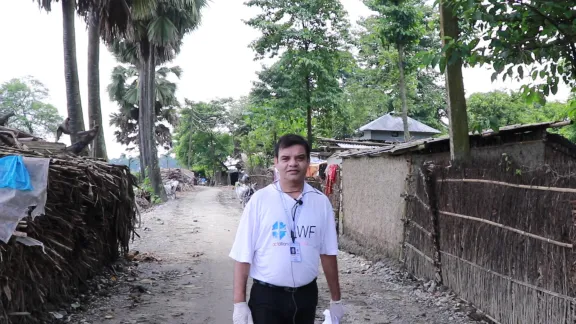
LWF project manager in Nepal, Gautam Yagya, briefs a local community about the LWF COVID-19 response during a handover of medical equipment at Morang hospital, Nepal. Photo: LWF Nepal
Women’s Human Rights Advocacy Training offers practical support to those advocating for change at grassroots level
(LWI) - The rice fields and forests of Morang in eastern Nepal are a world away from the magnificent halls of Geneva’s Palais des Nations. But for three weeks this autumn, Yagya Gautam, project manager for the Lutheran World Federation (LWF) in Nepal, is taking part in a Geneva-based human rights training program to learn how to become a more effective advocate for women and girls’ rights at United Nations level.
Gautam is one of more than 70 men and women taking part in the annual Women’s Human Rights Advocacy Training, organized over nine days between 26 October and 13 November 2020. The training course is jointly run by LWF and five ecumenical partners - the World Council of Churches (WCC), Act Alliance (ACT), ACT Church of Sweden (CoS), Finn Church Aid (FCA) and Mission 21, the mission society of the Reformed Protestant Church in Switzerland.
Normally, all participants are able to travel to Geneva and visit the Palais des Nations to witness first-hand how international human rights legislation is drawn up and how decisions are taken to demand accountability from governments across the globe. This year, due to COVID-19 restrictions, the course was partly online and partly in person, but participants agree that it has still provided a vital opportunity to learn more about effective gender justice advocacy.
Intersectionality of women’s rights
LWF has a “strong commitment to women and girls, to persons with disabilities, Dalits, people at risk, disaster affected people, ex-bonded laborers and indigenous communities,” Gautam says. “The training has provided very practical lessons to me,” he continues, particularly in understanding “the intersectionality of women’s rights and the many factors that contribute to their oppression and deprivation of dignity.”
The sessions focus on challenges facing those working for gender justice, including the increase in violence against women that has been reported in countries around the world as a result of COVID-19 and related quarantine measures. “I got to realize the importance of religious communities and institutions which can be a strong agent for change, for women’s empowerment and for understanding the value of gender justice,” Gautam says.
The sessions also provide hands-on training on how to design an advocacy plan, how to prepare reports for the Universal Periodic Review (UPR) process and how to engage with the Convention on the Elimination of All Kinds of Discrimination Against Women (CEDAW) reporting mechanisms.
From grief and pain to hope and life
Colleen Cunningham from the Moravian Church in South Africa (MCSA) is another of the participants attending the three-week training sessions. “After all the trauma related to COVID-19,” she says, “this has made me act and think of something else, moving from grief and pain to hope and life.” Cunningham, a member of the planning committee for the Thirteenth LWF Assembly in Krakow, Poland, says: “I sincerely thank you for changing my life and thoughts at this juncture.”
LWF’s Advocacy Officer for Gender Justice, Ms Sikhonzile Ndlovu comments: “When it became obvious that we would be under COVID-19 travel restrictions for most of the year, we decided to reshape the training to provide a virtual ‘blended’ learning experience for those who could not travel to Geneva. With the growing pushback on gender equality, we could not wait, but we had to keep the momentum going.”
The training aims to equip participants with skills and resources to conduct gender justice advocacy from the local level, to global level and back to their local context
Ndlovu adds: “The training aims to equip participants with skills and resources to conduct gender justice advocacy from the local level, to global level and back to their local context.” Despite physical limitations this year, the training sessions have provided important opportunities for participants to learn about best practices for gender justice that have been successful in different parts of the global Lutheran communion.
In his work to ensure justice for Nepal’s most marginalized women, Yagya Gautam says: “The arrangement of mobile courts to enhance women’s access to justice was really a new and replicable intervention which I will practice in my field as well.” He concludes: “The training has encouraged me to stand up for those who are being discriminated, oppressed and being undervalued in Nepalese society.”


